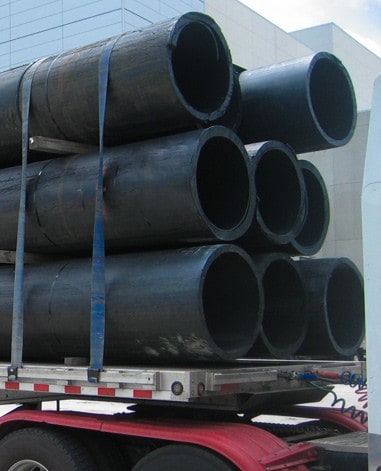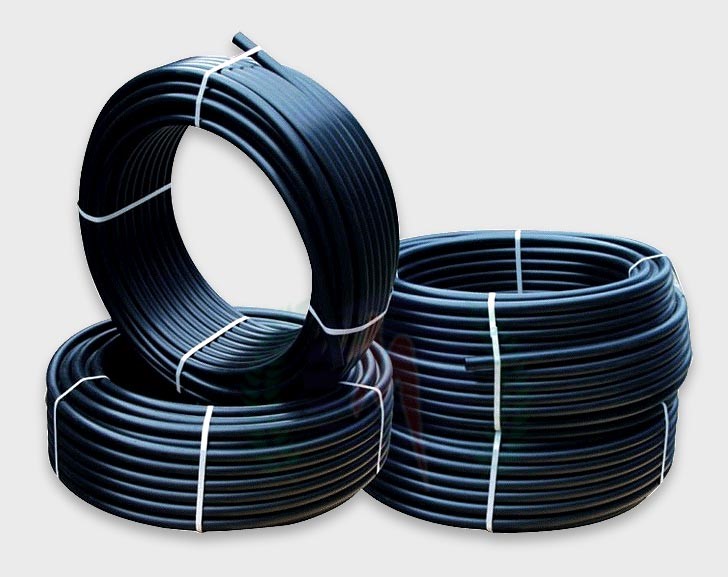A Comprehensive Guide to the Different Usages of HDPE Pipe in Construction and Sector
HDPE pipelines have actually emerged as an essential element in modern construction and commercial applications. Their distinct residential properties, such as resistance to deterioration and lightweight style, make them appropriate for a vast array of usages. From water system systems to agricultural irrigation, HDPE pipes supply remedies that enhance effectiveness and sustainability. Understanding their diverse applications is vital for professionals looking to optimize facilities. What particular benefits do these pipes offer each field?
Water Supply and Distribution Solutions
Water supply and distribution systems are essential parts of city facilities, commonly counting on high-density polyethylene (HDPE) pipelines for their sturdiness and efficiency. These systems transportation potable water from therapy centers to customers, making certain access and safety. HDPE pipes are favored for their resistance to rust, chemicals, and severe temperature levels, which boosts their long life and reduces upkeep costs. Additionally, their lightweight nature permits less complicated installation and transportation, making them perfect for different metropolitan and rural applications.
The versatility of HDPE pipes enables them to be mounted in tight spaces and around obstacles, lessening the demand for comprehensive excavation (hdpe pipe suppliers Midland TX). Furthermore, their smooth indoor surface lowers rubbing losses, improving water circulation rates. As cities remain to grow, the demand for reputable water supply systems enhances, placing HDPE pipes as a sustainable remedy for modern-day infrastructure projects. Their tested performance history makes them a preferred choice amongst engineers and metropolitan coordinators alike
Wastewater Management and Treatment
Efficient wastewater administration and treatment are vital for preserving public wellness and environmental high quality. HDPE pipelines play a crucial duty in this process due to their toughness, resistance to rust, and capability to stand up to harsh chemicals. These pipelines are generally made use of in different applications, consisting of sewer systems, stormwater drain, and wastewater therapy facilities. Their light-weight nature facilitates less complicated installation and transport, reducing labor costs and time.
On top of that, HDPE pipelines have a smooth indoor surface area that lessens friction loss, promoting effective flow rates. They are additionally much less vulnerable to leaks and failings compared to traditional materials, ensuring that pollutants are contained successfully. Furthermore, their flexibility permits flexibility in various soil problems, making them appropriate for varied environmental setups. As industries progressively prioritize sustainable techniques, the use of HDPE pipes in wastewater administration systems aligns with goals for minimizing environmental influence and improving source recuperation.
Agricultural Irrigation Solutions
In farming setups, effective irrigation services are necessary for maximizing crop returns and managing water sources. HDPE (High-Density Polyethylene) pipelines play an essential duty in contemporary watering systems due to their sturdiness, versatility, and resistance to rust. Their ability to stand up to high pressures makes them ideal for both surface area and subsurface watering applications, making certain uniform water circulation throughout areas.
Farmers can use HDPE pipes in drip watering systems, which deliver water straight to plant roots, reducing wastefulness and advertising healthy and balanced development. Additionally, these pipes are light-weight and simple to set up, decreasing labor prices and setup time. Their long life expectancy and low maintenance needs further boost their allure in agricultural practices.
Moreover, HDPE pipes are ecologically pleasant, as they can be reused and do not leach damaging chemicals right into the dirt. This makes them a lasting choice for farmers aiming to embrace green farming approaches while making the most of performance.
Industrial Applications and Processes
Versatility is a trademark of HDPE pipes, making them indispensable in different commercial applications and processes. These pipes are extensively made use of in chemical handling industries because of their outstanding resistance to a vast variety of harsh materials. HDPE's lightweight nature, integrated with high tensile strength, permits very easy setup and long-lasting performance sought after environments.
In the oil and gas industry, HDPE pipes play a vital role in transporting hydrocarbons and gases, thanks to their resilience and flexibility - Pipe Supplier American Plastics Midland. Additionally, they are used in mining procedures for the transportation of slurry and various other products, where typical piping systems might fail
HDPE pipes are increasingly made use of in manufacturing facilities for water supply lines and wastewater monitoring. Their capacity to hold up against extreme temperatures and pressures makes them ideal for a selection of commercial procedures. On the whole, HDPE pipelines add substantially to performance and safety and security throughout diverse industrial applications.
Stormwater Management and Drainage Systems
Stormwater administration and drainage systems are vital elements in city infrastructure, created to handle excess rains and lower flooding threats. High-density polyethylene (HDPE) pipelines are progressively made use of in these systems because of their longevity, flexibility, and resistance to rust. These pipelines effectively transfer stormwater away from booming areas, minimizing surface area drainage and stopping waterlogging.
HDPE's lightweight nature helps with much easier installation, lowering labor expenses and construction time. Furthermore, its resistance to chemicals and environmental stressors guarantees longevity and dependability in various environments. In addition to typical drainage applications, HDPE pipes are also utilized in cutting-edge services such as eco-friendly framework, that includes rainfall gardens and permeable sidewalks.

Regularly Asked Concerns
How Does HDPE Pipe Contrast to PVC Pipe in Expense?
Generally, HDPE pipeline often tends to be a lot more expensive than PVC pipeline due to its enhanced toughness and flexibility. Long-lasting price factors to consider, such as maintenance and lifespan, might prefer HDPE in certain applications.
What Is the Life Expectancy of HDPE Piping Under Numerous Conditions?
HDPE pipes generally have a life expectancy of 50 to 100 years, relying on environmental problems, installment practices, and usage. Factors such as temperature level, soil kind, and exposure to chemicals can considerably influence their resilience.
Can HDPE Pipeline Be Recycled After Use?
Yes, HDPE pipes can be reused after use. The recycling procedure includes melting down the product, permitting it to be repurposed into new products, consequently advertising sustainability and reducing environmental effect related to plastic waste.
Are There Any Kind Of Specific Setup Challenges With HDPE Pipelines?
Installation obstacles with HDPE pipes include appropriate jointing methods, guaranteeing appropriate trench conditions, and managing thermal development. Furthermore, skilled labor is required to take care of specialized equipment, which can complicate the installation process in various here environments.

What Certifications Should I Look for When Investing In HDPE Pipelines?
When acquiring HDPE pipes, one must try to find qualifications such as ASTM, AASHTO, and ISO, which validate quality and compliance with market criteria, guaranteeing sturdiness and performance in different applications. - Texas hdpe pipe manufacturer